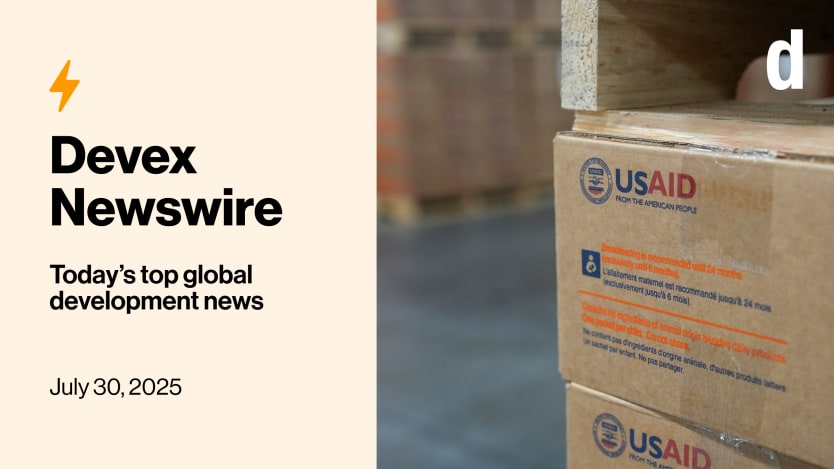
A senior USAID official says contracting officers were left “completely alone” after U.S. President Donald Trump froze foreign aid. In a six-page memo, Andrea Capellán describes mass contract cancellations, ignored court orders, and bogus reviews.
Also in today’s edition: A reset for food systems? Tributes for Dr. David Nabarro, a towering force in global health and crisis response, and environment ministers mull climate finance and Africa’s development future.
+ Join us today at 2 p.m. ET for a Devex Pro Briefing with Dr. Neil Buddy Shah, the CEO of Clinton Health Access Initiative. Shah will discuss the most pressing questions facing the health sector after unprecedented global health funding disruptions. Save your spot now. This event is exclusively for Pro members. Not yet a Devex Pro member? Start your 15-day free trial.
Whistleblower calls out dysfunction
For six months, Andrea Capellán asked for answers. Instead, the USAID director said she and other contracting officers got a “minefield of questionable and potentially illegal orders” after the Trump administration froze foreign aid in January.
In a blistering six-page memo filed July 28 and verified by my colleague Elissa Miolene, Capellán accuses agency leadership of mass contract terminations without authority, ignoring court orders, and abandoning staff.
“In the end, stripped of our positions and denied lawful guidance, institutional accountability, and ethical leadership, all I could do was bear witness, document the truth, and refuse to lend my name to actions that violated the law and the public trust,” she wrote.
Her memo includes more than 40 emails and official notices. Among the claims: USAID gave no plan for repaying partners after court rulings, and the General Counsel offered only outdated advice from 2011.
“The closeouts and terminations will take years to finalize,” she warned, with no road map for the “hundreds of millions of dollars of associated costs.”
She also questioned claims that U.S. Secretary of State Marco Rubio reviewed each cancellation: She did not believe there was “any evidence of individual determinations or analysis.”
That blows a hole in the administration’s legal defense, says Lauren Bateman of Public Citizen Litigation Group: “This internal agency document corroborates that there was no such individualized review.”
Others say Capellán’s memo captured what staff endured. “This memo outlines the bravery of rank and file career USAID staff in exposing the sham ‘foreign assistance review,’” says one former officer. Another was more blunt: “This was an environment where if you went against anything, you were fired.”
Still, not everyone agrees with where she pointed the finger. “This is a great memo, but she sent it to the wrong people,” says a senior contracting officer. It should have been sent to Trump and Rubio, the officer says.
Exclusive: USAID director alleges ‘malfeasance’ since Trump aid freeze
+ It’s news quiz time! Scroll to the bottom to see if you can ace our quiz.
Leaders call for a food systems reset
Food systems face unprecedented strain — from climate shocks, conflict, and economic disruption — and improving them is more urgent than ever. But at the U.N. Food Systems Summit +4 Stocktake, or UNFSS+4, in Addis Ababa, leaders say there’s still reason for hope, as countries share progress and lessons through high-level dialogues aimed at turning plans into action.
“Globally, food systems are facing immense pressure from climate shocks, conflicts, inequalities, and economic disruptions,” Ethiopian Prime Minister Abiy Ahmed said at the opening plenary.
“At the same time, development assistance is declining, and agricultural cooperation is under strain. These challenges threaten production, supply, dignity, and the stability of nations.” He highlighted a recent surge in Ethiopia’s wheat production — a recurring theme throughout the day — though there are some discrepancies in understanding exactly how large this surge has been due to differences between official figures and external assessments.
Italian Prime Minister Giorgia Meloni called for a broader view of food beyond hunger and poverty. “We would be making a serious mistake if we limited ourselves to looking at food systems through the face of poverty, suffering, and hunger,” she said. “Food systems are an engine of growth and development … at the heart of our action there must therefore be the development for the communities where we choose to focus our efforts on.”
At the center of the summit are dialogues — including several ministerial-level sessions on Monday — where officials from dozens of countries exchanged lessons and challenges on issues ranging from public finance and trade to managing transitions, my colleague Ayenat Mersie, who is on the ground at UNFSS+4, tells me. Organizers say these peer-to-peer discussions are key to turning national strategies into real change.
Speaking at a press conference, U.N. Deputy Secretary-General Amina Mohammed was asked whether the world is on track to meet its ambitious 2030 food systems targets. “If you look at all the statistics today on the current trend, no, we will not,” she said. “But … what we have seen demonstrated by Ethiopia in such a short time … gives us a lot of hope.”
She also spotlighted one of the most urgent crises: “The country that worries me most in terms of food security and access to food is Palestine,” she said. “There’s absolutely no reason today why we should be seeing children and people starving in what is quite clearly a manmade event.”
+ Want to connect or share what you’re seeing on the ground? Drop Ayenat a line at ayenat.mersie@devex.com.
Global health giant dies
Dr. David Nabarro, a towering force in global health and crisis response, has died at 75. From cholera in Haiti to the COVID-19 pandemic, he brought clarity and compassion to chaos — and left a legacy that stretches from remote villages to U.N. boardrooms. “David brought clarity where there was confusion, and humanity where there was despair,” says Paul Polman, business leader and campaigner.
Before becoming a trusted U.N. troubleshooter, Nabarro worked with NGOs and government aid programs in some of the world’s poorest communities — a grounding that shaped everything he did. “It means everything I do now, I think back to the people with whom I was working in villages and towns ... [and ask] ‘Is what I do now actually going to impact on them?’” he told Devex in 2017.
He helped build institutions such as the Global Fund to Fight AIDS, Tuberculosis and Malaria and the Scaling Up Nutrition Movement, and later became a global champion for food systems reform, Devex Senior Reporter Jenny Lei Ravelo writes. For Nabarro, “nutrition was never just about food, it was a core element of societal change and development,” says the SUN Movement.
Nabarro’s work to address malnutrition earned him the World Food Prize and the Helen Keller Humanitarian Award. A British citizen, he was knighted in 2023 for services to global health.
“Sir David believed in inclusive, farmer-centred food systems. … He consistently recognised farmers not just as beneficiaries, but as essential actors in driving sustainable, equitable transformation,” said the World Farmers’ Organisation.
Just days before his death, Nabarro was excited for UNFSS+4 in Ethiopia. “Gosh, I sound so excited. ... You want me to tell you things that I’m worried about. But I’m a systems thinker. And I believe that you work with what you’ve got,” he told Ayenat.
“David cared about people and our planet. ... Applying a systems approach and leadership was the only way … [to] tackle the complex challenges of today,” says long-time colleague and former Swedish ambassador for global health Dr. Anders Nordström.
As Shawn Baker, who previously served as USAID’s chief nutritionist and director of nutrition at the Gates Foundation, puts it: “We owe it to David’s legacy … to carry his torch with a renewed sense of urgency and purpose.”
Read the obituary: David Nabarro, who led fight against pandemics, malnutrition, dies
+ For more content like this, sign up to receive Devex CheckUp, our free weekly newsletter that provides front-line and behind-the-scenes reporting on global health.
Bold pledges, no new money
The African Ministerial Conference on the Environment — Africa’s biggest environmental meeting since Trump’s aid cuts — was recently held in Nairobi. Ministers agreed to “move from commitments to concrete delivery,” as incoming AMCEN President Ibrahim Munir put it. Delegates adopted the Tripoli Declaration, which pushed forward innovative financing, plastics regulation, and tech-powered green growth.
But while ministers talked adaptation and climate justice, no new climate finance commitments came from donors, Devex contributing reporter David Njagi writes. “We don’t know yet what will be pledged,” said Fred Boltz, head of the programming division of the Global Environment Facility, adding negotiations won’t wrap until March. Meanwhile, Africa needs about $277 billion every year to address climate change — and it's getting just $30 billion.
Frustration boiled over among civil society leaders. “An important part of this conversation is not just how much funding Africa receives, but where the money goes,” said Greenpeace Africa Food Campaigner Elizabeth Atieno Apolo. She criticized “false solutions” such as carbon credits and urged funds to reach “community-based fishers, indigenous peoples, and smallholder food producers.”
Catherine Koffman, director of the Africa region at the Green Climate Fund, said reforms are underway to speed up disbursement and increase direct access for African entities. “We have reformed our process internally to be more efficient, to be faster,” she said. But activists are still waiting for action — not more promises — ahead of COP30 in Brazil.
“Ultimately, COP30 must reflect a fair and inclusive climate agenda,” said Christopher B. Kabah, director of planning and policy at Liberia’s Environmental Protection Agency. “The continent must come together with a clear, collective voice.”
Read: Environment ministers mull climate finance, Africa’s development future
In other news
Five UNICEF employees abducted by a Haitian gang earlier this month were released Monday. [The New York Times]
The United Kingdom announced Tuesday it will move to recognize Palestinian statehood if Israel fails to agree to a ceasefire and take steps to end the conflict. [BBC]
Republican lawmakers are pushing legislation to cut U.S. funding for the Organisation for Economic Co-operation and Development, citing its role in global tax initiatives that allegedly disadvantage U.S. companies. [Financial Times]
Test your brainpower
Take the rest of our five-item news quiz based on July’s most-read news articles.
Sign up to Newswire for an inside look at the biggest stories in global development.








